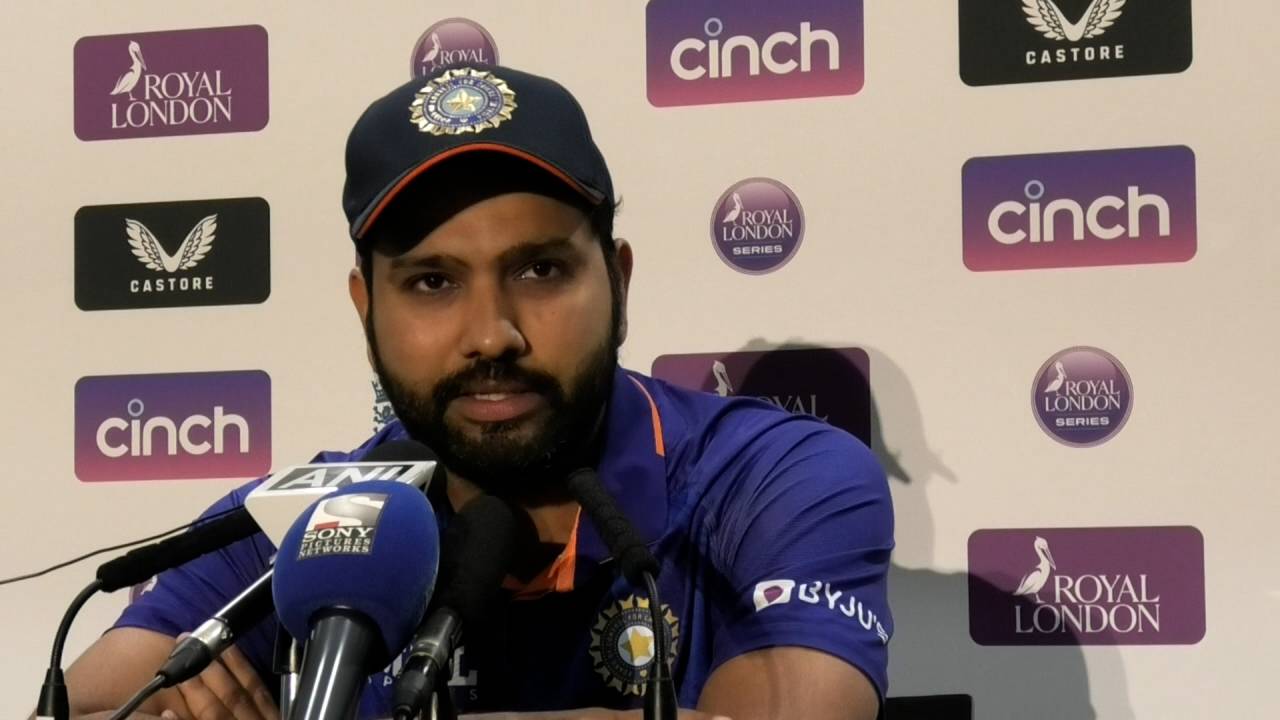Rohit Sharma wants India to be more positive in tricky chases
India suffered their worst collapse in the first-ten overs since the 2019 World Cup semi-final
Nagraj Gollapudi
15-Jul-2022
The chatter around Lord's on Thursday morning - at the ground and on social media - was about pleasant memories of two historic matches played at the venue. For Indian fans, it was the 2002 NatWest Trophy triumph. For the locals, it was the iconic 2019 World Cup final, when Eoin Morgan's England pipped Kane Williamson's New Zealand by the barest of margins three years to the day.
A lot of Indian fans would remember that time for a different reason. Three days earlier, in the first semi-final at Old Trafford, India's top order had collapsed against New Zealand. They were reduced to 24 for 4 in the first ten overs.
Several batters from that match were at Lord's on Thursday and they suffered a strangely similar fate. After the first powerplay, India were 28 for 3, their lowest score in that phase since the World Cup semi-final. At 31 for 4, when Virat Kohli was dismissed, it was earliest India had lost their first four wickets since that match three years ago.
A topic that has generated some debate recently is the relevance of ODI cricket. While there are some areas, including the playing conditions, that need a relook to bring more balance to the 50-over game, one straightforward fix is to make pitches that give the bowlers more of a chance in a batter-dominated format. And that's what we've witnessed in the first two matches of this series.
At The Oval on Tuesday, a green pitch combined with humid and cloudy conditions helped Jasprit Bumrah and Mohammed Shami skittle a powerful England batting line-up. In contrast, India's openers Rohit Sharma and Shikhar Dhawan chased down the target of 111 effortlessly.
Yet two days later, Rohit and Dhawan were unable to replicate that success, both showing vulnerability in demanding conditions. Rohit was late to cover the line of a delivery from Reece Topley that moved in slightly to hit his front knee, while Dhawan was uncomfortable against the tight line of the deliveries England's bowlers fired at his ribs. For a while Dhawan tried to counter by jumping out of his crease to negate any movement, but that plan proved unsuccessful as he gloved a catch to the wicketkeeper down the leg side.
Rishabh Pant was dismissed spooning a full toss straight to mid-on, and the batter who had hit an audacious century in the Edgbaston Test, walked off shaking his head. The absence of two crucial elements in Pant's limited-overs game - the freedom with which he bats in Test cricket and the instinct for that unthinkable shot - is a problem neither he nor the team management have managed to crack.
As for Kohli, he started with a flourish but once again made a mistake that is becoming far too common for his liking: pushing at a delivery he could have safely left. He now has one more innings to try and find his form before taking a break from the tour of the West Indies.
"I want these guys to take the game on and see if they can find something different about their own game rather than looking at the team's role. If they get the team out of that situation imagine the confidence they are going to get from that."Rohit Sharma wants India's batters to change their mindset and be positive
The two-paced pitch presented a challenge for the batters and England's well-executed plans made India's task tougher. Suffocating lines, unwavering lengths and attacking fields set by England captain Jos Buttler confronted the Indians to think differently.
And that - to think differently - is something Rohit said India needed to do when faced with high-pressure situations, going as far back as the 2017 Champions Trophy final against Pakistan, when they were reduced to 72 for 6 in a huge chase at The Oval.
"It has happened for us on a few occasions now," Rohit said after the defeat at Lord's. "We've spoken about that a lot, it has happened not just in the 2019 World Cup, but also in the Champions Trophy and few other games as well where we were put under pressure, we lost wickets and we were 20 for 3 or 40 for 4.
"That is where I want guys to change their mindset a little bit and try to be a little positive, extra positive and try and take the game on. Because I know the target is small, you are chasing 230, 240, but is there another way that you can take when you are chasing a target like that? Is there something different you can do as a batting unit? And I think so, yes, you can."
Does that mean Rohit wants his batters to play with the attacking intent they showed during the T20I series victory against England? "That is where I want these guys to take the game on and see if they can find something different about their own game … If they get the team out of that situation, imagine the confidence they are going to get from that. It is something that has been spoken about, but it depends on the individual at that moment as well. That is where the role of the management comes into play - to ask them to play freely and show them that what they are trying in the middle is absolutely right."
With the series level at 1-1 and the decider looming on Sunday, India have one more opportunity to put their captain's words into practice, as they head to Manchester for the first time since that World Cup semi-final three years ago.
Nagraj Gollapudi is news editor at ESPNcricinfo

